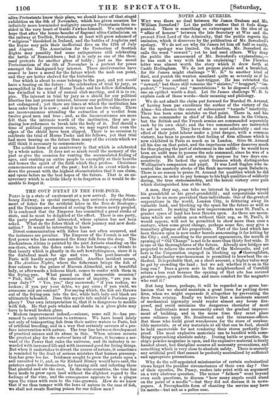THE CORP D'ETAT IN THE FISH-POND.
Runs is in a state of excitement at a new arrival. By the Stras- bourg Railway, in special carriages, has arrived a strong detach- xnent of fishes for the artificial lakes in the Bois de Boulogne ; and the Parisians are charmed at seeing the waters newly peopled. It is confessed that the Emperor has committed a great stroke of state, and he must be delighted at the effect. There is one party, the party perhaps most interested, whose opinion has not been asked. What do the fishes think of their journey and new desti- nation? It would be interesting to know.
Direct communication with fishes has not often occurred, and the instances are peculiar. The Emperor of the French is not the first power who has summoned the finny folk from the deep. The Enchantress Alcina is painted by the poet Ariosto standing on the sea-shore, where the fishes came to do her homage,—a tribute to that beauty which is ghastly in its soft bewitchingness, since it is the diabolical mask for age and vice. The poet-laureate of Paris will hardly accept the parallel. Another incident occurs, in The Arabian Nights, where the fisherman brings the fish of four colours to the palace of Haman Alraschid, and a beautiful lady, or afterwards a hideous black, comes to confer with them in the frying-pan. What passed on that memorable occasion ? "Fish, fish," asked the commissioner of inquiry, "are you in your duty ? " "Yes, yes," they answered ; "if you reckon, we reckon ; if you pay your debts, we pay ours ; if you yield, we overcome and are content." For saying which, the fish are thrown out of the frying-pan into the fire, while both lady and black are ultimately beheaded. Does this mystic tale unfold a Parisian pro- phecy? Our own interpretation is, that it is dangerous to meddle --with fish. He that puts whales and sharks in „a glass globe may 'have to bewail broken glass.
• Modern improvement indeed,—science, some call it—has pre- srumed to carry intervention to extremes. We have heard lately not only of transporting fish from their native waters to Paris, but of artificial breeding, and in a way that certainly savours of a pro- fane intervention with nature. The true line between development of practical science and its abuse is this. When science secures the greatest play for the natural laws of Nature, it becomes a ser- -vent of the Power that rules the universe, and its industry is re- warded with increased life and with increased good for living things. But when it undertakes to divert the course of nature, it sometimes is reminded by the fruit of serious mistakes that human presump- tion has gone too far. Irishmen sought to grow the potato upon a soil unsuited to it, and, as Sir Richard Birney would have said, the potatoes spoke for themselves, by turning sick and infecting those that planted and ate the root. In the wine-countries, the vine has been made to grow upon land without the slightest regard to the feelings of the vine, and the consequence appears to be a plague -upon the vines with ruin to the vine-growers. How do we know 'that if we thus tamper with the laws of nature in the case of fish, we shall not create floating poison for our fellow men ?


























 Previous page
Previous page